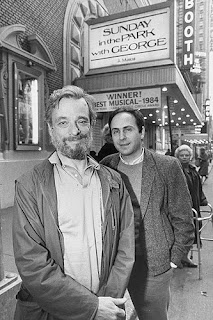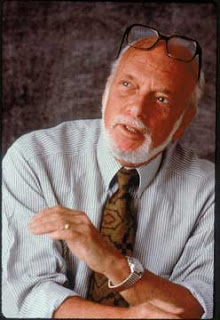 I'm reading this terrific book, Directors and the New Musical Drama: British and American Musical Theatre in the 1980s and 90s
I'm reading this terrific book, Directors and the New Musical Drama: British and American Musical Theatre in the 1980s and 90sSeveral things in this book have struck me...
I had never thought about it in these terms before, but for the most part, American musicals (at least during this period) came from the Rodgers and Hammerstein tradition, while European musicals came from the Brechtian tradition. (Think La Cage aux Folles versus Les Miserables.) Of course the exception to this are the musicals of director Hal Prince, who picked up Brecht's baton in America back in 1966 with Cabaret. (To be fair, a few shows had done it earlier, like The Cradle Will Rock, but not many, and virtually none that were successful.) New Line's work comes much more from Brecht than from R&H. Duh.
 Another interesting tidbit is about the difference between Stephen Sondheim's musicals with Hal Prince and the Sondheim musicals with director-writer Jim Lapine. The Sondheim-Prince shows, Company, Follies, Pacific Overtures, Sweeney Todd, and Merrily We Roll Along, are about narrative and social commentary. The Sondheim-Lapine shows, Sunday in the Park with George, Into the Woods, and Passion, are more about mood and personal, emotional issues. Prince was interested in society (just look at his non-Sondheim shows like Evita and Kiss of the Spider Woman) while Lapine is interested in the individual (as in the Lapine-Bill Finn shows, like the Falsettos trilogy and A New Brain). New Line's work plumbs both those worlds.
Another interesting tidbit is about the difference between Stephen Sondheim's musicals with Hal Prince and the Sondheim musicals with director-writer Jim Lapine. The Sondheim-Prince shows, Company, Follies, Pacific Overtures, Sweeney Todd, and Merrily We Roll Along, are about narrative and social commentary. The Sondheim-Lapine shows, Sunday in the Park with George, Into the Woods, and Passion, are more about mood and personal, emotional issues. Prince was interested in society (just look at his non-Sondheim shows like Evita and Kiss of the Spider Woman) while Lapine is interested in the individual (as in the Lapine-Bill Finn shows, like the Falsettos trilogy and A New Brain). New Line's work plumbs both those worlds.One of the points the book makes about this second kind of more individualized musical is very interesting -- because commercial musical theatre had always been by necessity a collaboration, those classic shows never really came from one person's experience or emotions. But the more individual voices of the nonprofit musicals, often with music and lyrics by one person, sometimes with the book by that same person (think of Rent), often came from one person's experience, one person's life, one person's emotion. Compare the Sondheim shows Company and Sunday in the Park. Both are about single men grappling with personal issues. But Company is about marriage and commitment in 1970s America, while Sunday is about The Artist. The social versus the personal.
So which is Evita? I think Tim Rice meant it to be personal, but Hal Prince wanted it to be social. I believe New Line's production will be more inclined toward Rice.
The other element of Lapine's work that I see in New Line's work is his process, his fondness for shaping a show slowly over time. He's fine with putting a "first draft" of the staging on its feet and then tinkering with it, much like a writer or painter might do. I've learned over time that I don't have to have all the right answers (as if there really are "right answers") the first time we stage a scene. I just have to get us on the right road. There's always time to adjust or even totally re-stage a scene later on.
 Maybe the most interesting thing to me in the book -- and I guess I should have known this -- is that Evita really started the mega-musical trend. We don't think of it that way because it didn't have massive set pieces or special effects, and maybe also because almost the whole production staff was American. Perhaps because of the disagreement between the writers and director over the approach, Evita in its original form had a split personality, partly coming from the Prince-Sondheim model and partly acting as a prototype for the European mega-musicals to come.
Maybe the most interesting thing to me in the book -- and I guess I should have known this -- is that Evita really started the mega-musical trend. We don't think of it that way because it didn't have massive set pieces or special effects, and maybe also because almost the whole production staff was American. Perhaps because of the disagreement between the writers and director over the approach, Evita in its original form had a split personality, partly coming from the Prince-Sondheim model and partly acting as a prototype for the European mega-musicals to come.One quote in the book really grabbed me. Talking about his mentor, the legendary director-writer George Abbott, Hal Prince says, "He really unabashedly wants people to have a good time, and sometimes I don't give a damn. I want to stimulate them."
Amen, Hal. I couldn't have said it better myself.
Long Live the Musical!
Scott





1 comments:
Agreed, an excellent, useful book
Post a Comment